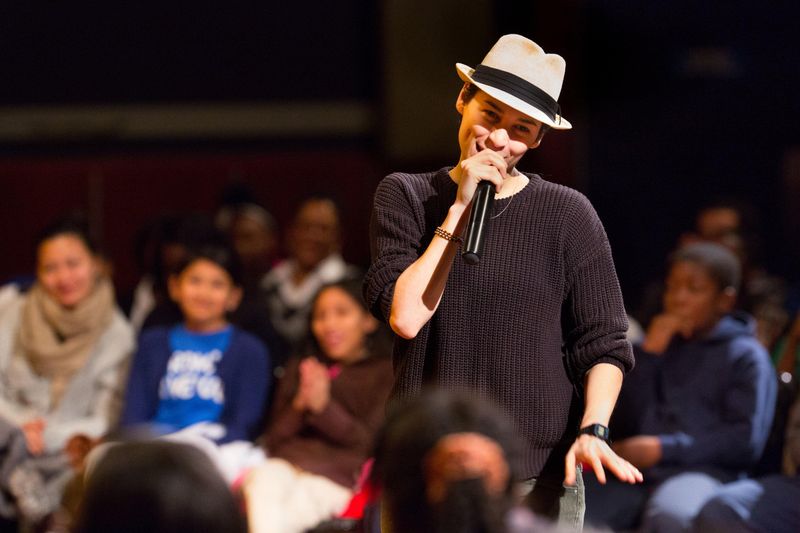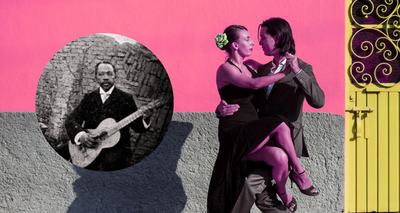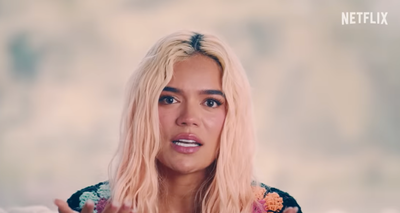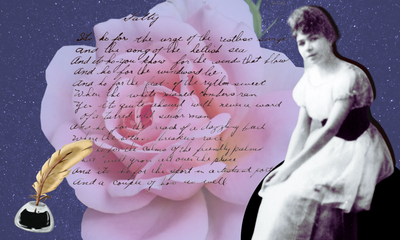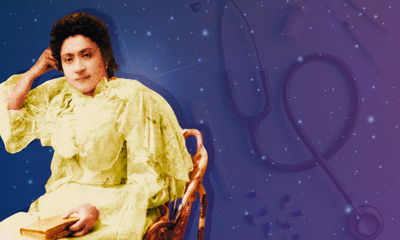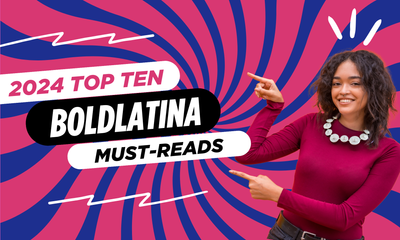A poet, a performer, a spoken word artist. A queer Latina. A Nuyorican. These are all aspects of Denice Frohman that come out at once in her presence. These are all parts of her identity that, like she puts it, have no reason to exist within silos. Like poetry is set up to hold more than one thing at a time, Denice holds and reflects plurality in her speech, in her inflexions, in her gestures. We ask her about her work, the tense relationship between Latinxs and language and how to make a living out of poetry, out of art.
Many Latinxs don’t feel quite comfortable with their Spanish, but also feel English as somewhat foreign. What is your relationship with Spanish and English? And how can Latines be empowered in their relationship with either language to produce literature and poetry?
My relationship with English and Spanish is complicated, and is fraught. I’m a language worker; language is my toolkit. For me, it is also about mapping my relationship with language, and trying to re-imagine it.
My mom was born in Puerto Rico and my father is a white Jewish Latin jazz musician, so I grew up in a multicultural home. My mom is primarily a Spanish-speaker. That is her first language. Spanish was around me my whole entire life. But I was not raised to be fluent; I speak conversationally and my fluency is better now than it was when I was younger. I didn’t change that I paid attention to the temperature and the pitch of the language that was spoken around me. My dad being a musician and my mother always playing salsa and merengue around the house, I didn’t always understand the words, but I understood the power of language, because I was paying attention to how the words were delivered, and the weather of those words, the temperature of the language, the inflexion, how a word can make you feel by how it was delivered. That was something that I carry with me and that influences my work.
Regarding English, it’s always complicated for me, because I’ve seen how English-dominant spaces have been really othering for my mom. She understands some of what I write, but she doesn’t understand all of it. I always wrestle with that question: how do I write something that in some way my mother can understand. There’s always that tension for me, in the work that I do, but I think it’s a tension that is worth exploring.
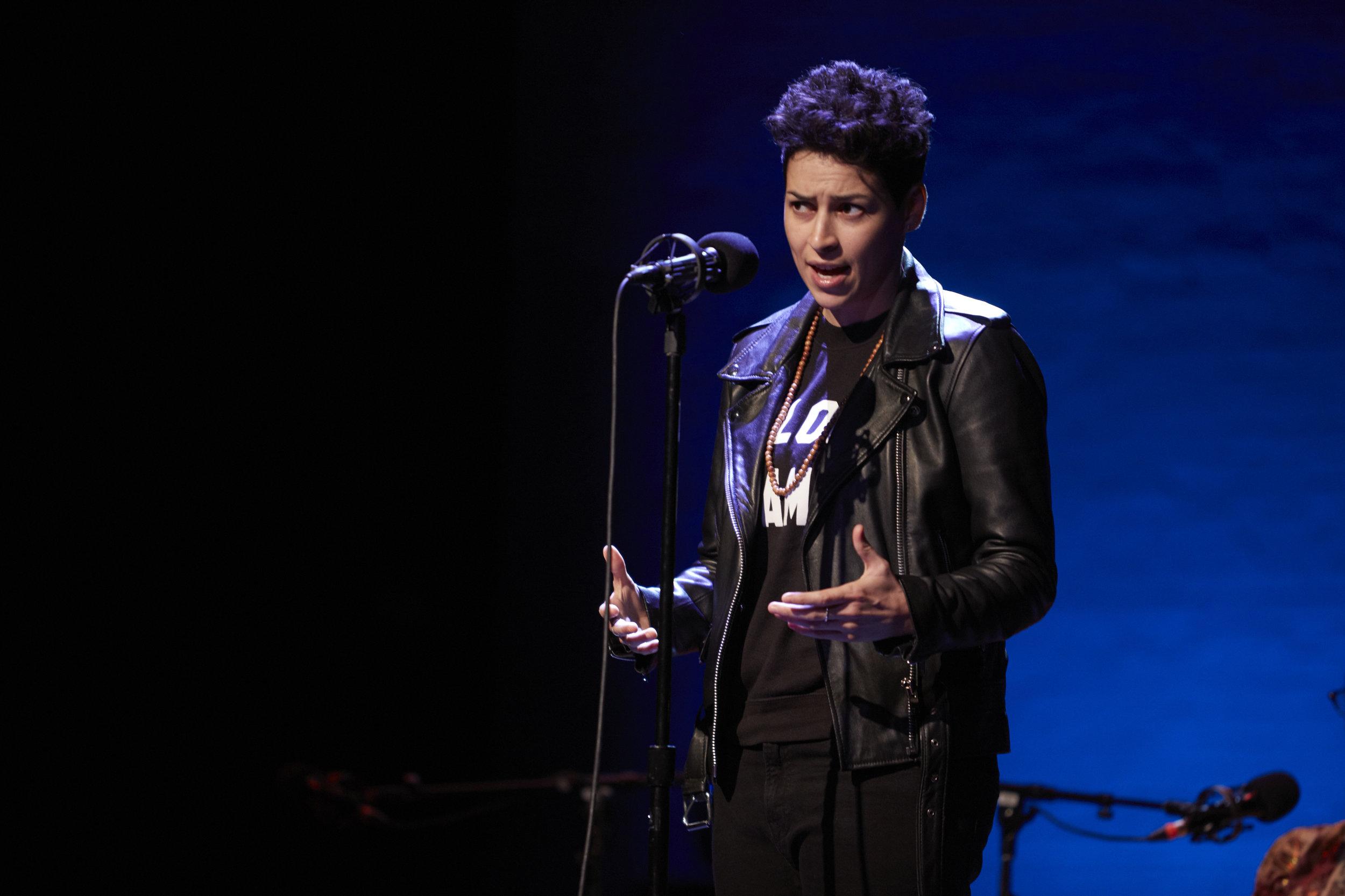
There’s a very big component of orality in your writing. Should your poetry be read or listened to?
That’s a question that exists in the poetry community. What we say is “The page versus the stage,” which is something that a lot of poets have pushed back against; that notion that these are two widely separate worlds.
The assumption is that if a poem sounds good out loud, if there is a “sonic” quality to it, for the ear, for the listener, then somehow it can’t work on the page. And that’s simply not true. I’m less interested in the juxtaposition between those two, because it creates this binary that I think is actually really harmful and racialized, because we know that spoken word in the oral tradition is something that comes from many different communities of color. If we look at the songs, the boleros, the décimas, the coros, the bomba plena —which is an Afro-Caribbean tradition of dancing and music— we’re looking at traditions that value sound, that value meaning, and that value what those two things can do when brought together in very powerful ways. I am equally captivated by poems that are said out loud as well as poems that I read in print, and I think it’s important to talk about the various effects that those poetries can have, rather than distilling them in these two widely separate categories, which I don’t think is reflective of the richness of the poetry that I’ve experienced.
Your poem Accents was turned into an animated short film. Did you participate in any way in its production?
Yeah, absolutely! It was a very exciting collaboration between myself and TED Ed. They have a series called There’s a Poem for That, which essentially pairs a contemporary or classical poem with an award-winning animator. I got paired with an animator named Robertino Zambrano, based in Australia, who did an amazing job at giving Accents a new life, adding that visual component that literally danced with the language on the page. It was really a tremendous collaboration that I’m really proud of!
In the live version of Accents, there’s something that’s missing in the animation, which was the public laughing! It feels almost like a stand-up routine. Do you intend to be funny?
That live performance was at the Nuyorican Poets Café, which is a really iconic venue for poetry in general, but also where the Nuyorican Poetry Movement found a home. I would not be here if it wasn’t for them! It’s different when you’re performing a poem in front of people who are not laughing at my mom, they’re laughing because they know my mom! Because they have their mom too, that has an accent.
I’m not a comedian by any stretch of the imagination, but I think that humour can be used to critique power. Humor is very disarming. You can be laughing at something and laughter creates a pathway for reconsideration. Humour is a very powerful form of critique and a very powerful rhetorical device.
When we get to examine certain social justice issues, our defenses immediately pop up. We want to defend our position, we want to defend the idea that we’re not wrong or that we know everything. We get very defensive because these are very sensitive topics. Humour can be used as a way to work around that.
It is hard to make a living for Latines, for women, for queer folk and for artists. In that sense, you’re basically a unicorn! How do you make a living out of art? What do you recommend to young Latinxs and queer people who want to monetize their art, their work.
It was something that I spent a lot of time thinking about early on in my career. I’ve had several full-time jobs. For me, it was about making that leap to being a full-time artist when I felt my artistic career had grown to a place where I could take that leap. I’d been performing for almost a decade before I ever was able to do it.
I never sought to monetize my work. I never sought to go viral. In fact, there were not many viral poetry videos by the time that one of my first videos, Dear Straight People, went viral in 2013. And I didn’t even know there was a camera in the room! My philosophy has always been that if you continue to work really hard and create things that matter to you, your audience will find you, and collaborators will find you. Every piece of work you create leads you to the next opportunity. I wrote poems that mattered to me, and I was lucky that they were filmed.
I also toured colleges for many years and that’s how I was able to go full-time. But prior to that, I was not able; I was doing it after work and on the side, and it was really grueling. I also applied for a local grant in Philadelphia that supports women artists and I was lucky enough to get a transformational gift that paired with devoting more time to these shows and events outside of work. I was able to finally leave my job.
But it’s not easy and a lot of people who are incredibly talented do not have the privilege of being a full-time artist. The only thing I can say is: Continue to make the things that you love, because they will last forever. No one can take that away from you. And we know that, in the art world, the people who pull the levers do not look like us or identify like we do, but we are out here and there is such an appetite for our voices and our stories!
If you’re Latinx, Latina, LGBTQ, queer, know that you can write the things that matter to you. They don’t have to be in silos: you can write about being a queer Latina. Poetry is set up to hold more than one thing at a time, to hold plurality. I came to poetry because I didn’t have to make sense to make meaning. I didn’t have to be legible to be discoverable. I still mattered, even in my nuance, even in my mess.
The beautiful thing about queerness is that we always find each other.
Help Power Up Our Work. Sign up for our ‘BoldLatina News’ or Invest In Our Future Become A ‘BoldLatina Collective’ Member
Would you like to see your poems translated into Spanish? Or write poetry in Spanish?
It’s something that I’m working on. I’m working on my manuscript now for my debut poetry collection. When that comes out, I would love it for all of it to be translated into Spanish.
Most of my friends are Latina, Latinx and queer. When we’re together I’m speaking Spanish with them and it’s really empowering! When I was younger, a lot of my attempts to speak were mocked, made fun of. “You didn’t say that right.” “That’s not how we talk.” “That’s wrong.” Even that makes you shut down. Or people questioning “Why don’t you speak fluently?” as if that were my choice.
In Spanish we have gender-neutral language, and in English you have non-binary pronouns, such as they, ze, zir, hir. As someone who works with language, how do you feel about this historical moment in which languages are expanding to fit our new gender identities?
Language has always moved. It always bends, and blends like we do. Language evolves, and I really feel grateful to my trans Latinxs friends who really push the boundaries of language and to those pushing against the gender binary. I don’t understand people who are offended by the term Latinx. Language should be unpacked. It should be a space where we can have dialogue.
The language we inherit is not always the language we need to keep. For me, I’m always interested in conversations that involve examining language and trying to get closer, if we can, to a language that feels like home. I would not judge or get in the way of anybody trying to find the language of home for them.
*This interview has been edited for clarity.
About Denice:
Denice Frohman is a poet, performer, and educator from New York City. A CantoMundo Fellow, she’s received residencies and awards from the National Association of Latino Arts & Cultures, Leeway Foundation, Blue Mountain Center, and Millay Colony.
Her work has appeared in The BreakBeat Poets: LatiNext, Nepantla: An Anthology for Queer Poets of Color, The New York Times, ESPNW and garnered over 10 million views online. A former Women of the World Poetry Slam Champion, she’s featured on national and international stages from The Apollo to The White House, and over 200 colleges and universities. She has a Master’s in Education and co-organized #PoetsforPuertoRico. She lives in Philadelphia.

